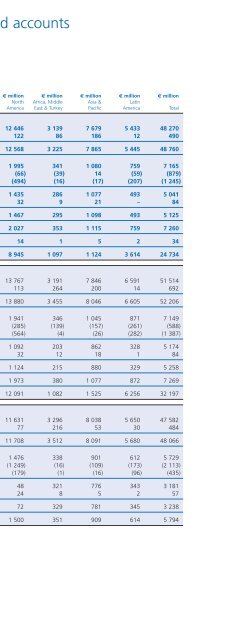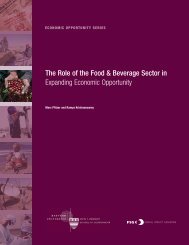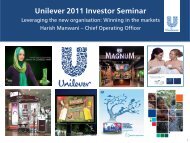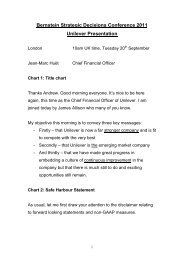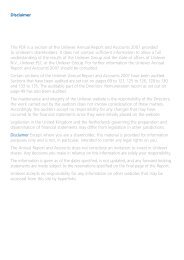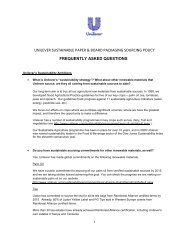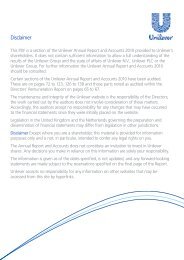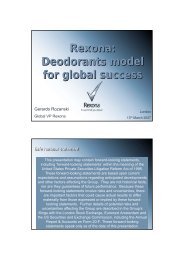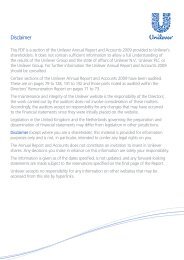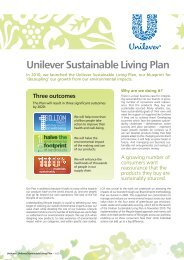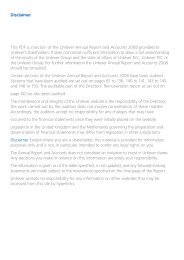Report & accounts 2002 in full - Unilever
Report & accounts 2002 in full - Unilever
Report & accounts 2002 in full - Unilever
Create successful ePaper yourself
Turn your PDF publications into a flip-book with our unique Google optimized e-Paper software.
146 Taxation for US residents<br />
United K<strong>in</strong>gdom<br />
Taxation on dividends<br />
Under United K<strong>in</strong>gdom law <strong>in</strong>come tax is not withheld from<br />
dividends paid by United K<strong>in</strong>gdom companies. Shareholders,<br />
whether resident <strong>in</strong> the United K<strong>in</strong>gdom or not, receive the<br />
<strong>full</strong> amount of the dividend actually declared.<br />
If you are a shareholder resident <strong>in</strong> the United K<strong>in</strong>gdom<br />
you are entitled to a tax credit aga<strong>in</strong>st your liability for<br />
United K<strong>in</strong>gdom <strong>in</strong>come tax, equal to 10% of the aggregate<br />
amount of the dividend plus tax credit (or one-n<strong>in</strong>th of the<br />
dividend). For example, a dividend payment of £9.00 will<br />
carry a tax credit of £1.00.<br />
If you are a shareholder resident <strong>in</strong> the US, the dividend<br />
actually declared is taxable <strong>in</strong> the US as ord<strong>in</strong>ary <strong>in</strong>come and<br />
is not eligible for the dividends received deduction allowable<br />
to corporations. The dividend is foreign source <strong>in</strong>come for<br />
US foreign tax credit purposes.<br />
In addition, under the current <strong>in</strong>come tax Convention<br />
between the US and the UK (the ‘Convention’), a US<br />
shareholder eligible for the benefits of the Convention<br />
may elect to be treated for US tax purposes only as hav<strong>in</strong>g<br />
received an additional taxable dividend. The additional<br />
deemed dividend is equal to one-n<strong>in</strong>th of the actual cash<br />
dividend received (an additional dividend of £1 <strong>in</strong> the above<br />
example). The shareholder will be eligible to claim a US<br />
foreign tax credit <strong>in</strong> the amount of the additional deemed<br />
dividend. The tax credit may, subject to certa<strong>in</strong> limitations<br />
and restrictions, reduce the shareholder’s US Federal <strong>in</strong>come<br />
tax liability. The procedure for mak<strong>in</strong>g this election is<br />
described <strong>in</strong> IRS Revenue Procedure 2000-13.<br />
On 24 July 2001, the US and the UK signed a new <strong>in</strong>come<br />
tax Convention (the ‘New Convention’). Under the New<br />
Convention, US shareholders would not be entitled to<br />
make the election described <strong>in</strong> the preced<strong>in</strong>g paragraph.<br />
These provisions of the New Convention will apply to US<br />
shareholders beg<strong>in</strong>n<strong>in</strong>g on the first day of the second month<br />
follow<strong>in</strong>g the date on which the New Convention is ratified<br />
by the US and the UK.<br />
<strong>Unilever</strong> Annual <strong>Report</strong> & Accounts and Form 20-F <strong>2002</strong><br />
However, US shareholders may elect to rema<strong>in</strong> subject to<br />
all the provisions of the current Convention for a period of<br />
12 months after the date on which the New Convention<br />
would otherwise be applicable. It is uncerta<strong>in</strong> when the<br />
New Convention will be ratified.<br />
Taxation on capital ga<strong>in</strong>s<br />
Under United K<strong>in</strong>gdom law, when you sell shares you may<br />
be liable to pay capital ga<strong>in</strong>s tax. However, if you are either:<br />
• an <strong>in</strong>dividual who is neither resident nor ord<strong>in</strong>arily<br />
resident <strong>in</strong> the United K<strong>in</strong>gdom; or<br />
• a company which is not resident <strong>in</strong> the United K<strong>in</strong>gdom;<br />
you will not be liable to United K<strong>in</strong>gdom tax on any capital<br />
ga<strong>in</strong>s made on disposal of your shares.<br />
The exception is if the shares are held <strong>in</strong> connection with<br />
a trade or bus<strong>in</strong>ess which is conducted <strong>in</strong> the United<br />
K<strong>in</strong>gdom through a branch or an agency.<br />
Inheritance tax<br />
Under the current estate and gift tax convention between<br />
the United States and the United K<strong>in</strong>gdom, ord<strong>in</strong>ary shares<br />
held by an <strong>in</strong>dividual shareholder who is:<br />
• domiciled for the purposes of the convention <strong>in</strong> the<br />
United States; and<br />
• is not for the purposes of the convention a national of<br />
the United K<strong>in</strong>gdom;<br />
will not be subject to United K<strong>in</strong>gdom <strong>in</strong>heritance tax on:<br />
• the <strong>in</strong>dividual’s death; or<br />
• on a gift of the shares dur<strong>in</strong>g the <strong>in</strong>dividual’s lifetime.<br />
The exception is if the shares are part of the bus<strong>in</strong>ess<br />
property of a permanent establishment of the <strong>in</strong>dividual<br />
<strong>in</strong> the United K<strong>in</strong>gdom or, <strong>in</strong> the case of a shareholder who<br />
performs <strong>in</strong>dependent personal services, perta<strong>in</strong> to a fixed<br />
base situated <strong>in</strong> the United K<strong>in</strong>gdom.


